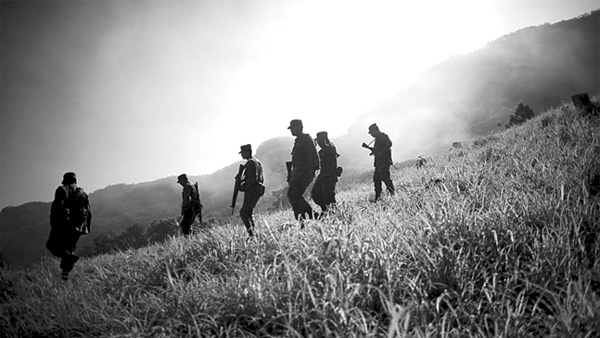
|  |  |  Editorials | Opinions Editorials | Opinions  
Mexican Drug Wars Rage On
 Tom Ford - Winnipeg Free Press Tom Ford - Winnipeg Free Press
go to original
March 15, 2010


| | Mexican soldiers patrol a field in the war on drugs; tourists may leave a bigger footprint than the dealers. (Miguel Tovar/Associated Press) |  |
Puerto Vallarta, Mexico - At an international airport near this Pacific Ocean community, a tall gangling soldier in a helmet and camouflage uniform stares at me, the lower part of his face masked to protect his identity, his rifle on his shoulder, his finger near the trigger. And I stare at him.

I'm not sure what the soldier is thinking. I'm thinking Mexican airports have changed a hell of a lot since I started coming here 30 years ago.

I have been in and out of Mexico five times. On my first visit, I forgot my passport. I showed the border official my Ottawa Transit Commission bus pass. He loved it. It had my picture on it, and the bold signature of a guy he didn't know. Welcome to Mexico, amigo.

The Puerto Vallarta airport was buzzing with police and military officers because Mexican President Felipe Calderón was there. He needs security. Three years ago, he started what has become a vicious war to eradicate the drug cartels that use Mexico as a highway to transport drugs from South America to Canada and the United States.

"Calderón is our first president to take on the drug lords," says a young historian. "He is pursuing his attack aggressively, bringing in the federal police, the army and now the marines."

The cost has been high. More than 15,000 people have been killed in gang violence since the war began. Ciudad Juarez, across the U.S. border from El Paso, saw 2,660 of its 1.3 million citizens murdered in 2009, making it the world's deadliest city outside a war zone. About 90 per cent of the weapons used by the drug cartels come from the U.S.

It's an odd war. You can travel through central Mexico and the nation's coastal regions and never know it was on. I visited Paradise Village, near Puerto Vallarta, a 400-acre resort owned and operated by Victoria B.C.'s Sovernigo family that has more than 42 years' experience in the real estate development business.

In effect, the Village is a new community with a marina, golf course, 100-store shopping centre, long beach and a myriad of spas, pools, restaurants, bars and sports facilities found in big international resorts.

The resort has strict security, but you don't notice it much. It's only when Calderón is in the neighbourhood that you find out what security is all about. On our way to the airport, we pass a sandbagged machine gun post; heavily-armed officers stop cars and search their trunks just as they do in Iraq; armoured vehicles are positioned at a key intersection; army personnel guard the airport's entrances and exits; a small gunboat bobs in the bay.

My young historian friend thinks Calderón is winning the war. "Four cartels have already been shut down," he says. Many mornings the tabloids feature front-page photos of the dead bodies of drug dealers, some of them grotesquely bloated because they've been underwater. But some are not so sure about who's winning the war.

One certainty: The government still hasn't caught Mr. Big, Joaquin Chapo (Shorty) Guzman, 52, who has a $5-million bounty on his head. He's said to be the world's 41st wealthiest individual. Guzman and his wife, an 18-year-old ex-beauty queen, have been seen dining in Juarez restaurants, making some believe politicians are protecting him.

The parallel with the U.S. is eerie: Calderón can't find Guzman, Mexico's most wanted fugitive; Obama can't find Osama bin Laden, America's first most wanted. Add to that the similarities between the wars in Afghanistan and Mexico - and the role of drugs in both of them.

Drug trafficking is not Mexico's only problem with North America. The country is becoming over run by Sandalistas, those flip-flop-wearing tourists who love visiting nations as long as they are just like home. International resorts, such as Paradise Village, are in Mexico, but they are not Mexican. They lack the Mexican colour, creativity and quirkiness. I like Mexico because it's not like any part of Canada.

Near Puerto Vallarta, you can still live with Mexicans, rather than just look at them from a bus. The little oceanfront town of Becerias has unfinished buildings in pink, bright blue, and orange; old men in big hats; a jardin or town square alive with flowers; street merchants selling every conceivable kind of trinket and hideaway bars.

Not far away, up in the Sierra Madre mountains, San Sebastian still looks much the same as it did when it was a silver mining centre in the 18th century. "The first thing they've got to do is get rid of the cobblestone streets," a woman tells us. "Then they have to put in more bright lights."

In some ways, the Sandalistas will change Mexico more and be tougher to eradicate than the drug lords.

Tom Ford is managing editor of The Issues Network. |

 |
|  |



